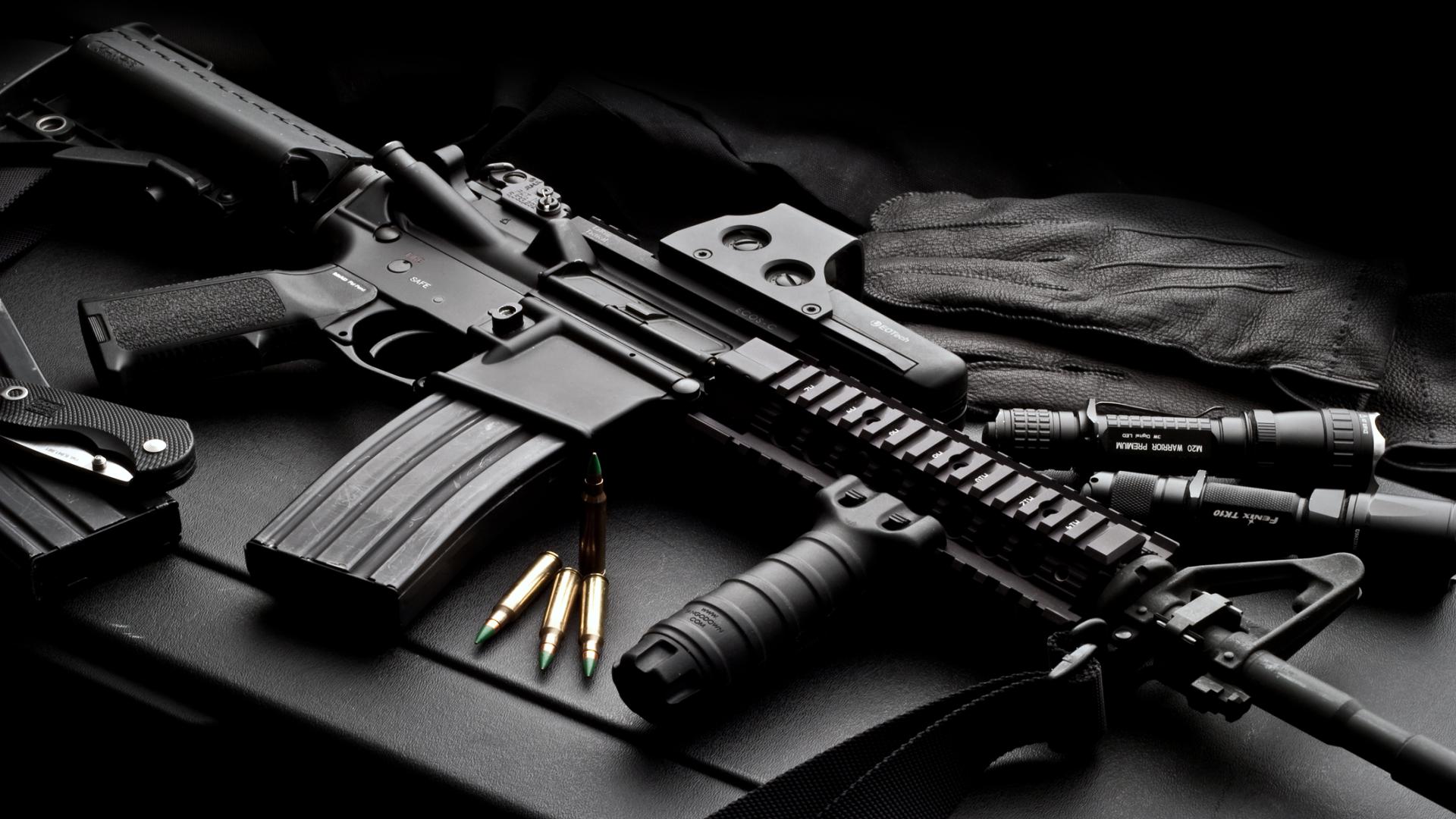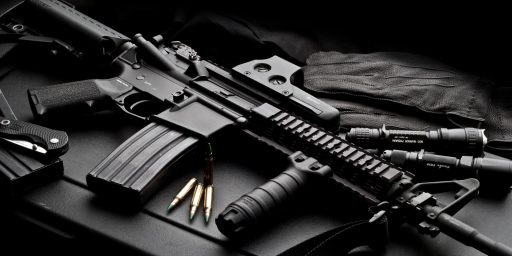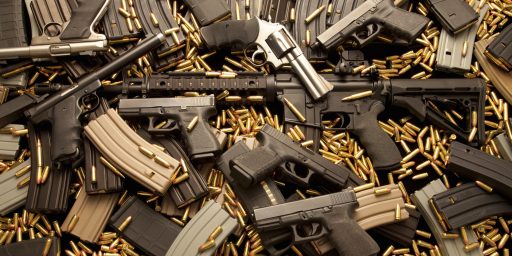Gun Control Around the Anglosphere
Our English-speaking brethren have much less tolerance for massacres than we do.

Writing for WaPo, Adam Taylor, Amanda Coletta and Jennifer Hassan examine “How countries around the world have responded to mass shootings.” They confine their efforts to four Commonwealth nations that, together with the United States, form the Five Eyes intelligence sharing inner circle.
In the space of less than two weeks, the United States has seen shootings that left six dead at a Walmart, five dead at a LGBTQ nightclub and three dead at the University of Virginia after a field trip to see a play.
I would note that these are very different incidents, in that two of them seem to be personally motivated while the other seems to be a genuine spree killing. But the common factor, of course, is the use of firearms.
These are just the latest shootings in the United States, where firearms are a bitter partisan political issue. Calls for strong gun-control measures tend to follow in the wake of such attacks, along with an outpouring of anger and grief on social media.
Many people around the world are once again asking the same question: Why won’t America take steps to end gun violence?
From the United Kingdom to New Zealand, here are the policy changes some countries have implemented after their own mass shootings.
Britain
In August 1987, Michael Robert Ryan fatally shot 16 people in Hungerford, England. The scale of the massacre shocked the country. At the time, The Washington Post described it as the “worst such incident in modern British history.”
Ryan, 27 and unemployed, was armed with a Chinese copy of an AK-47 and a variety of other guns. His motive was never discovered. He killed himself and his mother, his only close relative.
In response to the massacre, British Home Secretary Douglas Hurd called for an investigation into Ryan’s legal ownership of the guns he used. The Firearms (Amendment) Act 1988, passed with the backing of Prime Minister Margaret Thatcher’s Conservative Party government, outlawed semiautomatic weapons and limited sales of some types of shotguns.
These weapons were rare in Britain, so the impact was limited. But after another shooting in March 1996, when Thomas Hamilton killed 16 children and their teacher at Dunblane Primary School in Scotland using Browning and Smith & Wesson handguns, more-sweeping rules were put in place.
Public anger over the killings led to a powerful grass-roots campaign called Snowdrop. The 1997 Firearms Act ended up restricting ownership of almost all handguns. Tens of thousands of guns were collected from owners, who were given market value for the weapons. Police spent years cracking down on illegal gun ownership.
Gun violence peaked in 2005 and has generally declined in the years since.
Relatives of those who died in Britain’s mass shootings have said their experiences could help the United States reckon with gun-control legislation.
“Eyes are going to be on Dunblane, and we don’t need the eyes on Dunblane anymore,” Jack Crozier, whose 5-year-old sister Emma was killed in the massacre, said at an anniversary event in March 2021. “But we need to be looking at what is going on in other countries, and America in particular.”
What we know about the victims of the Buffalo grocery store shooting
Australia
Martin Bryant, 29, killed 35 people near the historical Port Arthur prison in Tasmania, Australia, using a legally purchased Colt AR-15 semiautomatic rifle in April 1996. It was the deadliest massacre in Australia during the 20th century and came just weeks after the killings in Dunblane.
The slayings drew widespread attention to Australia’s gun laws, which were especially relaxed in Tasmania. The island, which has its own state government, had required gun licenses only since 1988 and did not require rifles to be registered.
The Australian federal government, then led by center-right Prime Minister John Howard, coordinated with states to restrict the ownership of automatic and semiautomatic rifles and shotguns. Within a year, the government bought back 650,000 firearms.
Some studies have indicated that the program was successful and that Australia became a less violent place in the years since the buyback.
In 2013, Howard wrote an op-ed for the New York Times that called on President Barack Obama to follow his model. “Few Australians would deny that their country is safer today as a consequence of gun control,” Howard wrote.
New Zealand
In March 2019, Brenton Harrison Tarrant, 28, opened fire at two mosques in Christchurch, New Zealand, and killed 51 Muslim worshipers with weapons that included an AR-15-style rifle. Less than 24 hours later, New Zealand Prime Minister Jacinda Ardern announced that the country would change its gun laws.
Unlike Australia, New Zealand had relatively lax gun regulations and a powerful gun lobby. Before the attack, there were an estimated 250,000 gun owners in the country, which has a population of 5 million people. Tarrant, an Australian citizen who had been living in New Zealand since 2017, had purchased his weapons legally, although he had illegally modified some.
Ardern was able to gather swift support for tougher gun laws, putting temporary measures in place within days. The following month, Parliament made the changes official, with overwhelming bipartisan support and only one lawmaker opposed. Among the plans were a gun buyback scheme, as well as restrictions on AR-15s and other semiautomatic weapons.
Because of the lax tracking of these weapons, authorities were initially unsure how many were in the country. “It’s really an open checkbook,” Joe Green, gun safety specialist and former arms control manager for the New Zealand Police, told The Post, “because they don’t know how many they are buying back.”
A second round of gun laws was passed in 2020, which required setting up a new firearms registry that gun license holders were required to update as they bought or sold firearms.
In an interview with CNN’s Christiane Amanpour in May 2019, Ardern said she was bewildered by the United States’ reluctance to pass gun-control laws. “Australia experienced a massacre and changed their laws. New Zealand had its experience and changed its laws. To be honest with you, I do not understand the United States,” she said.
Canada
In April 2020, Gabriel Wortman, dressed in an authentic Royal Canadian Mounted Police uniform and driving a mocked-up police cruiser, went on a 13-hour rampage through rural Nova Scotia, killing 22 people in the deadliest shooting in modern Canadian history.
Police shot the 51-year-old denturist dead at a gas station. Court documents showed that he was armed with two semiautomatic rifles and two pistols. He did not have a firearms license, and some of the weapons were smuggled in from the United States.
Two weeks later, Prime Minister Justin Trudeau announced a ban on more than 1,500 makes and models of “military-style assault weapons,” including the AR-15 and the Ruger Mini-14, which was used in a 1989 massacre that left 14 dead at the École Polytechnique in Montreal. The ban makes it illegal to fire, transport, sell, import or bequeath those weapons.
Trudeau, who pledged stricter gun-control measures during the 2019 election campaign, said his government had been working on a ban before the pandemic. The Conservative Party said the ban, which was imposed through regulatory measures, was opportunistic.
An amnesty measure to allow people a grace period to comply was set to expire in April, but it has been extended through the fall of 2023. The government has pledged to develop a mandatory buyback program for the banned firearms, but there are few details on how it would work.
I give credit to these reporters for picking countries most analogous to the United States. (Granted, it happens to coincide with their assigned beats.) They’re all English-speaking and, again, are among our very closest allies precisely because of our shared cultural ties. Certainly, we have more of a frontier mentality than the Brits. But not more than the Canucks, much less the Aussies.
What’s interesting in all cases—granting that this is a reporter’s history and presumably not complete—is how single incidents sparked such radical change in policy.
The Brits really didn’t have much of a gun problem to begin with. Their police famously don’t even carry guns. Still, ownership was widespread and two incidents led to the banning of most long guns and then handguns. That gun violence peaked in 2005–nearly 20 years after the first of these acts—would indicate that bans aren’t a magic wand. But it worked over time.
Australia, which I consider the best analog to the United States culturally among the three, has enacted gun restrictions most of us would consider draconian. Indeed, I know Australian infantry officers who aren’t allowed to privately own sporting rifles, much less assault-style weapons.
So far as I know, none of the four Commonwealth members surveyed above have the equivalent of our Second Amendment. But the gun lobby has successfully fetishized it within living memory. We passed a ban on assault-style weapons during the Clinton administration that expired a few years back.
We don’t have the political will to ban weapons wholesale in this country. Even the bluest of blue states isn’t going to ban shotguns and single-action long rifles. But we have, in my memory, passed bans on “Saturday Night Special” pistols and assault-style weapons. Alas, the current iteration of the Supreme Court would stand in the way of doing so now.
It’s also noteworthy how universally military-style weapons are chosen by spree killers. Granting that these incidents are a tiny fraction of the overall gun crime problem in the country, there’s clearly a psychological attraction to these weapons in killing fantasies that outstrips their sheer utility as tools.






Thanks for this op-piece, James.
The problem we (Americans) have is that we now are at a place, a point, where we have an estimated supply of 400 million guns. There are no supply-chain problems with respect to civilian weaponry.
I have a hypothesis.
In the Commonwealth countries mentioned there is more of a recognition* that the government exists to undertake collective action to solve problems that individuals can’t. Compare that to Reagan’s “The nine most terrifying words in the English language are ‘I’m from the government and I’m here to help.'”
Also, much of the 2A rhetoric is about resisting a tyrannical government. That kind of fantasies do not really exist in other developed democracies, because 1) they’re democracies; 2) it’s pure fantasy.
* The US is really an outlier in this regard among developed democracies. Maybe part of it is frontier mentality, but also – I think – the fact that authorities in the US are often not very responsive to the people’s needs. Having an upper legislative chamber full of millionaires is NOT something one generally sees in other democracies. Or, as another data point, the kind of policing that people are too often subjected to.
A completely different point:
Perhaps there is a psychological attraction. More importantly thought, hese kinds of weapons – due to their high-energy projectiles, large magazines, and easy recoil – make it easy to kill many people even for relatively untrained shooters.
It takes some actual competency to quickly kill five people with a bolt-action rifle, or even an M1. With an AR-style rifle and a trip or two to a shooting range, even I might be able to pull it off if I were so inclined.
@drj: Sure. But semiautomatic weapons are the norm. And AR-style rifles aren’t all that great as firearms go; their military utility is that they continue to fire under field conditions and are relatively easy to maintain. (Although, it must be said—not nearly as much as the Soviet and Chinese AK-47 variants.)
My Canadian wife – who I will not let at the keyboard for this thread – would like you to know it’s because Americans are insane unless they were smart enough to marry Canadians. They’re especially insane about guns.
It’s fun to watch Jim Jefferies, Aussie comedian, in two Youtube clips on gun control. There’s also a clip of him on Conan’s show talking about the subject: there had apparently been a mass killing in France (?) by a guy with a truck and gun nuts emailed JJ with idiotic “maybe we should have truck control”. JJ points out to Conan that most countries do have truck control: he can’t buy a truck (I assume he meant a big one like the French guy used) because it requires him to have a license to drive that truck. And like most foreigners he can’t figure out what it is about guns that sets Americans off so much.
Once I was talking with a guy who told me, in all seriousness, that if government agents ever tried to confiscate his guns, he’d barricade himself in his house and die in a shootout rather than surrender his arms. Scary.
Rupert Murdoch passed through two of those countries, but he made the U.S. the permanent home for his propaganda mill. And he’s made guns a key element in his efforts to divide the nation.
I’m amenable to policies that would grant him his wish. We need to consider how to go about it.
[…]
There’s a saying that goes “The French are the world’s anarchists.” I think some of us in the United States are considering a run at first place in that contest.
Lots of differences between the US and the other former major British colonies. The US is just generally a much more violent country in every way(not just guns), we have the 2nd amendment, we are much bigger, have a different political system with a higher degree of federalism, and have a gun culture and a long history of normalized gun ownership by citizens – to name a few factors.
@drj:
There is nothing special about AR rifles in terms of lethality. Most any semi-automatic rifle with a detachable magazine is effective when the goal is to murder unarmed people at close range. This is why the so-called “assault weapons” ban didn’t do much because it addressed mostly cosmetic and tertiary features and did nothing regarding the core functionality of how a semiautomatic rifle actually works.
And semi-automatic pistols are not much different and are actually a much bigger problem but. Murders with rifles are comparatively very rare.
Banning AR’s will do nothing because there are plenty of other semi-auto rifle designs, and of course there are pistols and other weapon types that are just as effective for a spree killer. The 2007 Virginia Tech shooter killed 32 with pistols for example.
So as a practical matter I think for gun control to be effective you’d need to ban all semiautomatic weapons with detachable magazines and somehow confiscate the hundreds of millions currently in circulation.
I’ll reiterate my point from yesterday. If we did a dispassionate cost/benefit analysis on private gun ownership, we’d stop doing it. What did NZ, Oz, and the UK lose compared to what they gained?
I’ve seen the 3rd Amendment (quartering troops) described as the most useless amendment. Apparently it has never been cited in a court case. The 2nd goes far beyond useless. We need to recognize it for what it is, a political compromise offered to get the Constitution ratified. That was a one shot deal, 220 years ago. What’s it doing for us now?
Fortunately, the Founders had the good sense to write it with enough ambiguity to allow common sense interpretation. A condition that kept reasonable restrictions in place up until the FOX/GOP culture war and the Federalist Society.
@Just nutha ignint cracker:
Occasionally I wonder why someone would die in a gunfight rather than give up his guns. If you’re dead, the gun’s not going to be of much use to you, is it?
@CSK: The logic appears to be that without guns, one might as well be dead or is as good as dead. I think it’s part of the whole “they went down fighting–[CRT TRIGGER WARNING] (in defense of slavery)–at the Alamo” and lost cause crap that people cling to.
@Andy:
Mre violent than Australia? Hell, we’re not even more violent than the UK where grown men still brawl in the streets with insane regularity. No guns though, so they don’t usually end up with some man-boy running to his car to grab the Glock from the glove compartment.
@Andy:
Really? Because, despite the NRA talking points, actual research showed the previous assault weapons ban moved the needle.
@MarkedMan: Meant to include a link.
@CSK: A lot of them have that fantasy, and in 99.99% of them that’s all it is. Also, if they did, they wouldn’t last long. Rambo they ain’t.
Just a note about the issue of gun design and aesthetics.
“Assault” guns are most accurately described as “scary-looking military style badass toys”.
That is, they really don’t function much different than say, a wooden stock hunting rifle. But like a “Sport Coupe” version of a plodding family sedan that consists of having air foils and poilers and wider tires, they are tricked out to look like the sort of thing we see badass action heroes carry in movies.
But that’s the whole point. It isn’t intended that you take a Bushmaster out to hunt squirrels or deer, and target shooters don’t use them.
Their entire purpose is to be marketed to young men who want the thrill of feeling like a badass action hero. Bushmaster literally had an ad campaign saying, “Consider your man card validated” or somesuch.
All of which would be just as harmless as the young men painting flames on their dad’s Camry.
Except what we see in American gun culture is a toxic stew of rage and intolerance. The open carry enthusiasts who insist on carrying Bushmasters to the grocery store are renacting a page out of the Open Windows theory of urban crime, the part about how idle and dangerous young men paint graffitti and loiter on corners to mark territory, and decalre themselves the only source of power and control over the neighborhood.
We can’t excuse away the misogyny and lurking racism of American gun culture by noting how few of them snap and go on murderous sprees anymore than we can excuse street gangs by remarking on how rarely they actually kill someone.
The tacticool design of guns is designed to give every young man the sense of being a law unto himself, and the flaunting of the gun, like a broken window or graffiti, is designed to communicate to all the onlookers that the law has failed and order has broken down.
@Just nutha ignint cracker: Ah yes, the Texas Revolution. The first time Texas committed treason in defense of slavery. And the heroic defenders of the Alamo were planning to beat feet, but they left it too late.
@Chip Daniels:
Mother Jones has a copy. I don’t know about Bushmaster, but Daniel Defense, who made the Uvalde shooter’s rifles, offers really easy credit terms. I hope they got stiffed. But TX officials would probably honor Daniel, or the local store, repossessing them.
@gVOR08:
Never heard that part before.
Never let it be said that America is not a tolerant country. We just tolerate the crazy white, male, right-wing fantasies.
Of the countries listed as peers, how many had chattel slavery? Because when you’re looking for why America is so screwed up, half the time it goes back to slavery.
(The genocide of the indigenous peoples is not much of an issue most of the time, and definitely not an outlier with Canada and Australia on the list of peers)
But mostly, the commonwealth nations weren’t founded by a bunch of yahoos who broke away from the commonwealth. We have a very different creation myth for our country.
Canada: We we’re part of the Empire, and still kind of are.
US: We done kicked the asses of tyrants. (Tyranny not included most of the time)
Fun Fact: The Boston Tea Party was a protest by tea smugglers upset that the English were lowering the taxes on tea, so legal tea would be price-competitive with smuggled tea.
@Just nutha ignint cracker: When Tony Gilroy is done with Andor, I would love for him to do something about the Alamo.
@Just nutha ignint cracker:
The problem with the idealization of “heroic last stands” is that there needs to be someone left to care about them. There have been hundreds if not thousands of last stands over the course of history that have been completely forgotten about because no one was left to care enough to lionize the dead. We know about Thermopylae, Masada, the Alamo and Custer’s Last Stand because there were people who had a vested interest in keeping the mythos alive for morale or propaganda. There’s this idea that your heroic death will inspire others to rise up, complete your mission and then memorialize you as the great leader that gave them the courage to act.
All these gun nuts and mass shooters speak of sparking a revolution or rebellion in their preferred image – some want a race war, others want misogynic crackdowns, others want a fascist takeover of the world. All of them however, in every writing we find they leave behind, talk about how their actions will be the turning point to wake up the sheeple. The J6’s suffered from the same delusion that their actions would cause the nation to spring up and support them; had they really made it to the targets and started executing people, they truly thought the country wouldn’t have reacted with horror and struck back swiftly.
“Pry it out of my cold, dead hands” implies that their death won’t have been in vain and they are the vanguard of change. History is full of people who thought that and were wrong. Still doesn’t stop the delusion from infecting gun fetishists….
@Gustopher:
Indeed. Our original sin. And definitely true of the 2A. Much of it’s history revolves around Patrick Henry and others’ wanting a guarantee the new national government wouldn’t disarm Virginia’s militias, the slave patrols.
@Andy: C’mon Andy, you aren’t that dense. There is a hell of a difference between an AR-15/Ak-47 and a Remington Model 750.
#1: Magazine capacity: The 750 has a capacity of 4 rounds(there may well be after market magazines, I am not up to date on all the latest gun porn). Most AR variants have a minimum capacity of 20 rounds with after market magazines up to 30 or as much as 100 rounds. Let’s see, 4 rounds or 100… Which has more capacity for killing? You can do the math as well as I.
Never mind bump stocks and other ad-ons.
Hows about this ban: “No detachable magazines,all magazines are limited to 5 rounds or less.”
You’re right about this. I remember interrupting a conversation between a couple of good old boys at my local barber shop:
“Limiting magazine capacity! What a joke. You know how long it takes me to change a magazine???”
I interjected: “Long enough to stop Jared Loughner.” Shut them up. Mind you, I could have said, “If it’s no big deal, why fight it?” But it is a deal, and they dawg damned knew it and so do you.
You are absolutely correct, pistols are more concealable and just as deadly. Hence my focus on round capacity.
Yes. Exactly. And with a 5 year minimum sentence for possession of such a weapon and a buy back program with no sunset I think you would remove the vast majority of such weapons and the ones you didn’t would be ensconced within the walls to be removed once a month or so for the fondlings. You don’t have to confiscate, you just have to make the incentives persuading.
And no, you wouldn’t get them all. Stop letting the perfect get in the way of the good.
ftr: I have a Remington model 7oo bolt action in .30-06, 2 12 ga. pump action shotguns (1 short barreled), a .22 rimfire (Ruger 10-22, which I would give up in NY second for my son’s super sweet bolt action), the Ruger .357 revolver I bought when my ex’s husband and his buddies were leaving death threats on my phone every other day, and my wife has a Tauser .38 she bought when her ex was trying to kill her.
Once again, the left and left leaning approach this debate from a public policy perspective. It literally has zero to do with policy and what works vs doesn’t work.
Bottom line is, like Prisons, guns are a multi-billion dollar industry. We don’t regulate those types of businesses in a way that reduces profitable. Also, guns are one of the few things rural America can do with pretty low threshold of entry to make a pile of money.
Its not that people don’t care, they do, its just that Americans care more about money being made. We tend to kick business on the ground once people aren’t making money (i.e. crypto) The NRA is a strawman, they represents thousands of gun peddlers across the nation whose livelihood depends on the current regulations regime.
If Democrats ever hope to succeed with common sense regulation, they will have to launch a flanking attack that affects the profitably of gun sellers. That will reduce their ability to lobby at the National level to resist everything. I personally think class action lawsuits and insurance requirements for sellers might be a good start.
@Jim Brown 32:
If we care more about money than stopping the slaughter of schoolchildren, then no, we don’t care.
Let’s stop rationalizing it to make it seem many of us aren’t either selfish, amoral scumbags or just plain dumb. Americans love to think of ourselves as noble. Most of us are, maybe, but unfortunately our quirky electoral systems empower the deplorables.
@MarkedMan:
Quoted for emphasis.
Fascinating to see those who huff and puff about objective evidence and insistent they are nonpartisan continually devolve to empirically false corporate gun lobby talking points insisting bans won’t reduce gun violence.
Data from the US assault weapons ban and from those elsewhere prove otherwise.
@MarkedMan:
Barely moved the needle, to the point that any effect of the 1994 AWB is “unclear” when viewed through an objective lens. However, it should have been expected that the AWB would have only marginal impact. It was a milquetoast law that never had much of a chance of accomplishing much.
@Andy is correct, however. Getting rid of the sorts of weapons subject to the 1994 AWB would indeed have minimal impact on mass shootings. Off the top of my head, I can only think of one mass shooting where the use of an AR-15 (or equivalent) was even germane to the body count in any significant way, and that was Las Vegas and due to the range at which Paddock engaged his victims.
I remember thinking after Sandy Hook how stupid it was for Lanza to even use an AR-15. His body account would have been every bit as high had he used handguns (a la Seung-Hui Cho at Virginia Tech) and his chances of being challenged before the shooting even started would have been greatly reduced had he been carrying far more concealable handguns. Unfortunately, Lanza lucked out.
To have a real impact, I think @Andy is right again. We would need to ban all semi-automatic weapons with detachable magazines. The question will be whether such a ban, should the political will ever be found to pass it, survive legal challenges. Maryland’s 2013 gun law, which (IIRC) effectively banned the new sale of assault weapons as well as the new sale or manufacture of magazines greater than 10 rounds, has so far managed to survive challenges. But even that law is pretty tame since it does not prohibit people from buying high-capacity magazines out of state and using them in-state nor did it confiscate existing weaponry at all.
Heller was based, in part, on the effective banning of an “entire class of ‘arms’ that Americans overwhelmingly choose for the lawful purpose of self-defense.” So if a law banned detachable magazine semi-automatic handguns (which are clearly the 500-lb gorilla in the room when it comes to gun violence) while leaving revolvers, et. al. alone, would it survive legal challenges? Somehow I doubt that considering the current makeup of the Supreme Court.
@MarkedMan:
You’ve linked to a single study that doesn’t even look like it’s been peer-reviewed.
As J.P. Billingsgate noted, the scholarship on this is mixed at best and if the AWB had any effect, it was small in either direction.
@OzarkHillbilly:
The only reason the Remington Model 750 doesn’t have greater than 10-round magazines and other features available to AR weapons is that it is not a very popular rifle. There is no technical reason that prevents a 100-round magazine from being used with that rifle or any number of other accessories like bump stocks. They aren’t available because there isn’t a market for them. But if you want to create a market for them, then banning AR rifles would help accomplish that. Some other platform would take the place of the AR.
I think that will be useless whack-a-mole until one is willing to ban or more strictly control the entire class of semi-automatic, magazine-fed weapons, which is the vast majority of weapons sold today. And I don’t think one can torture the meaning of the 2nd amendment sufficiently to achieve that, which means one needs to repeal the 2nd, which very few seem interested in doing.
I wonder why the author neglects to mention that NONE of those countries operate under the presumption that their subjects have UNALIENABLE RIGHTS! For that reason, the Canadian government sicced the Canadian military on a convoy of trucks. Australia and NZ set up Concentration Camps, with dogs and guns, against the possibility that their subjects may object to being controlled. How about the FACT that Habeas Corpus, while a judicial guarantee here, is NOT a guarantee in any of the other English speaking countries, meaning that those arrested may be disappeared at the government’s pleasure?! Oh yeah, and we have the same thing going on here, in response to a “mostly peaceful” demonstration at the US Capitol!
If the folks at Quantico cannot find someone dedicated to the Constitution to teach their courses, perhaps they should get a drunk Corporal, who could do no worse, and would do it more cheaply!?
Semper fi
@John W Crawford:
The US Constitution does not provide an UNALIENABLE RIGHT for any individual to own and operate any firearm unregulated and unrestricted. The bought-and-paid-for shills on the radical right extremist Apartheid Court lie about this.
@Andy:
Of course, J.P. Billingsgate was spreading inaccurate right wing propaganda. The body of scholarship and data on this is not “mixed at best:” it rather clearly shows that an assault weapons ban + a ban on high capacity magazines would reduce gun deaths.
@J.P. Billingsgate:
So then how could a law that did this be “milquetoast?” The federal assault weapons ban included a nationwide ban on high-capacity magazines.
Outdated.
2020 study by Christopher S. Koper, associate professor of criminology at George Mason University and author of the now-superseded 2004 Justice Department study gun propagangdists love because it initially (and prematurely) found minimal effect:
A 2020 Northeastern University study (that also found states with more robust background checks were 60% less likely to suffer mass shooting incidents):
Louis Klarevas, Teachers College at Columbia University, reviewing the data in 2016:
2014 study by Mark Gius, Quinnipiac University, from Applied Economics Letters concluded “assault weapons bans are effective in reducing mass shooting fatalities…”
Like climate science, the verdict isn’t unanimous but the preponderance of evidence leans to only one serious conclusion, and per usual it’s not that being propagated by our unserious partisan right. Notably, those wrongly claiming a renewed/revised version of the 1994 assault weapon ban would be ineffective have not just cited nothing current, but nothing at all. Per usual.
@DK: Regarding climate science, what do you mean? Is there someone who denies that climate is changeable, or do you refer to something more ominous while accidentally forgetting to take a stand on the issue??
Semper fi
@John W Crawford: Regarding your rhetorical questions you don’t actually want answers for, do you think asking them makes you clever, or that I have any incentive to stop conservatives from destroying themselves with the climate change denial that has help turn a supermajority of youth voters against Republicans?
If you answer yes to either, I have bad news for you. I know better than to get in the way of a losing enemy that’s determined to keep losing. Carry on.
@DK: @DK: Did I not wish answers, I’d not have asked. Again, WHO denies that climate changes? Name a name, please, and let’s look at their claims about a static climate.
Semper fi
@John William Crawford: Again, you’re still obviously and transparently dishonest, as is typical of rightists.
Again, screw your phony questions you don’t want answers for.
Again, I’m not diginfying your bs by naming again. No means no, babe.
Again, Republican climate change denial is wby you lost and will keep losing.
You can ask and ask, but you’re going to get the same result. Doing the same thing and expecting a different result is the definition of crazy. I don’t know what part of “I’m not playing your dumb and blatantly mendacious question games” you can’t get through your thick skull, but that’s a you problem. And, again, it demonstrates why the right is losing. Again, keep digging your party’s grave. We love to see it.
@DK: @DK: And yet, no Republicans deny that climate changes. So no, the American people have largely come to understand that the entire premise is a scam and a red herring to distract us from more important things like the Biden family’s allegiance to the Communist regime of China!
Trying to insult an old Marine is a losing proposition, darling!
Semper fi